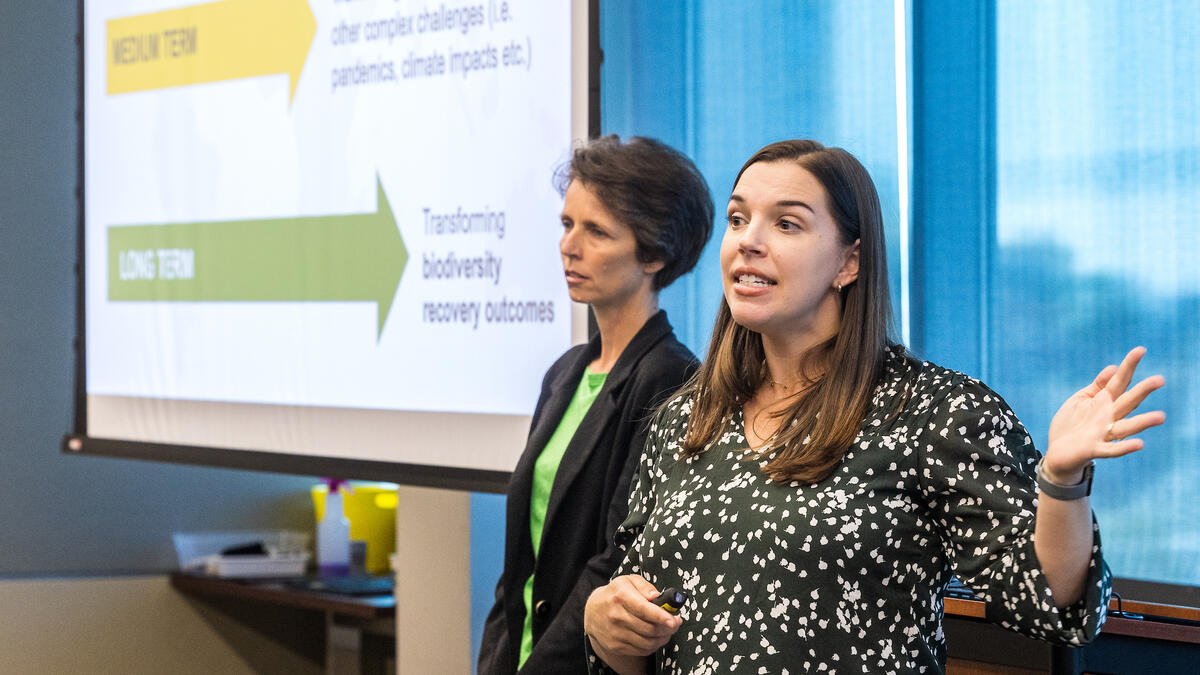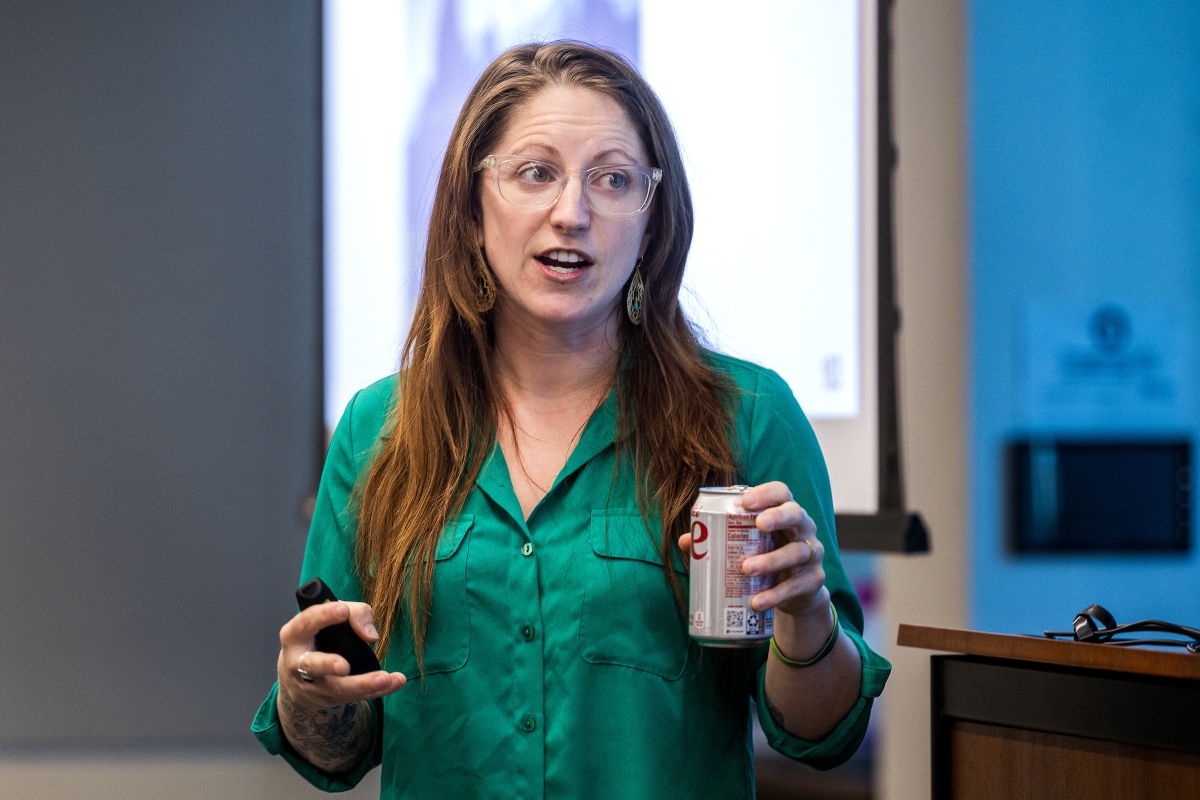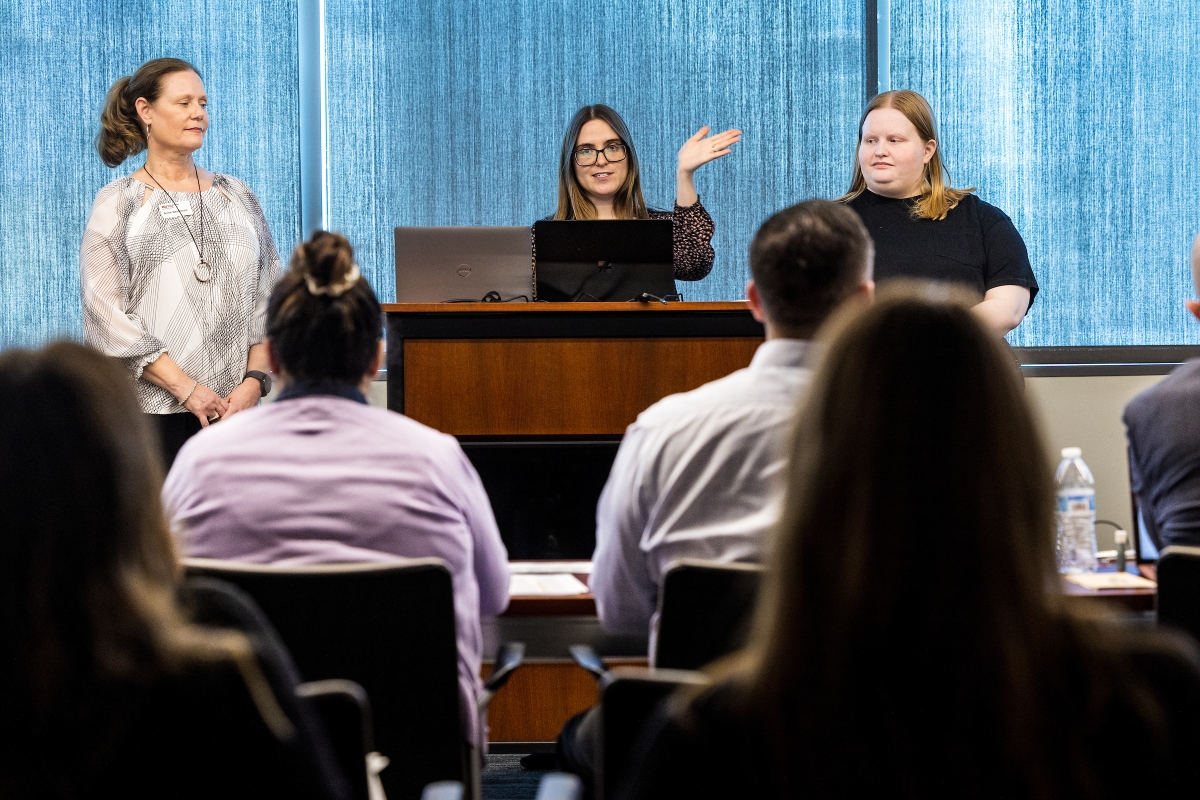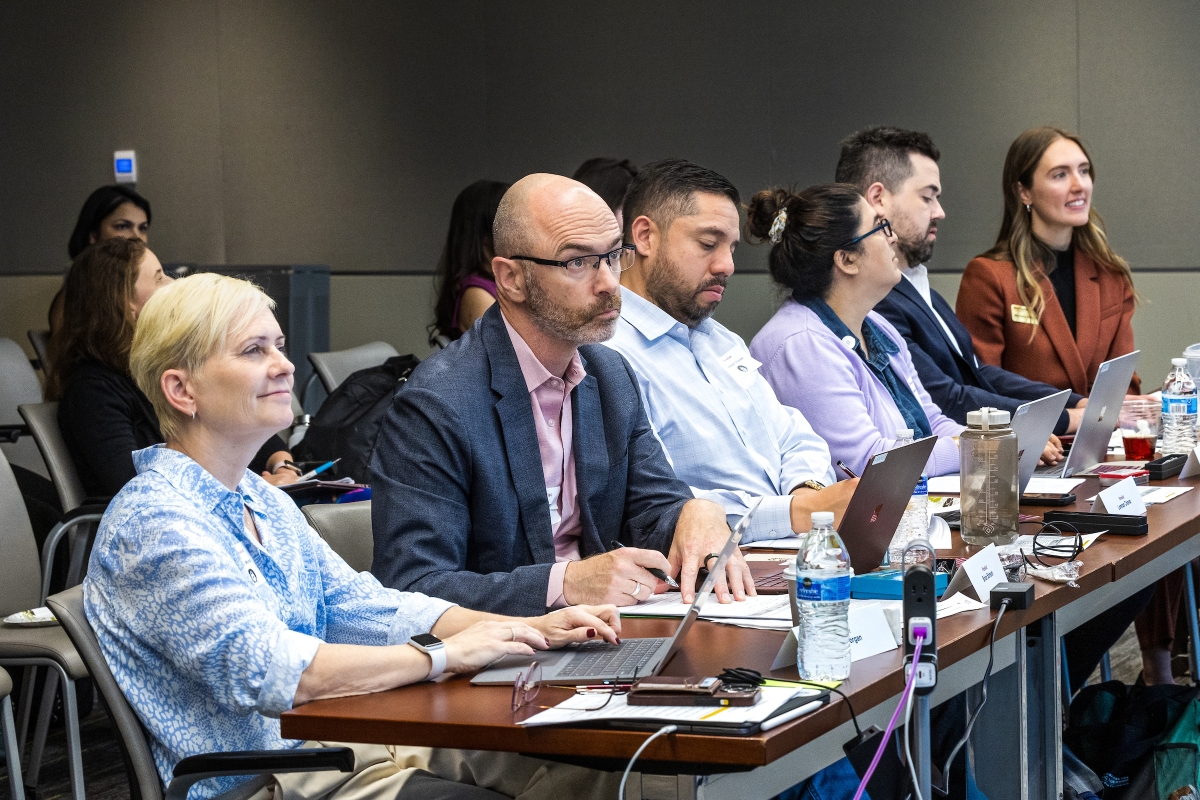Moonshot Accelerator preps life-changing ASU projects for big funding

Margaret Hinrichs (right), associate director of decision science at the Knowledge Exchange for Resilience and an assistant research professor in the School of Complex Adaptive Systems, and Gwen Iacona (left), an assistant research professor in the School of Life Sciences, present their project at the ASU Foundation Moonshot Accelerator pitch event on May 21 in the Fulton Center. Their project would create fellowships for conservation practitioners who manage endangered species in Arizona. Photo by Charlie Leight/ASU News
Arizona State University faculty and staff are working on some of the world’s biggest challenges — health disparities, plastic pollution and education inequity.
Over the past year, eight of these far-reaching initiatives across the university have been working with the ASU Foundation to hone their projects with the goal of getting funding to support them.
The new Moonshot Accelerator initiative taught the inaugural cohort of eight ASU teams how to strategically pitch their projects to philanthropic funders or corporate partners for large-scale gifts.
“Moonshot is used in philanthropy to define a big idea for social or environmental impact,” said Michelle Govani, director of the Moonshot Accelerator.
“And more broadly, ‘moonshot’ is a feature of American lore, and we use that term when we think about big, complex ideas that will take a lot of people, time, resources and ingenuity to achieve.”
The accelerator has a curriculum of monthly modules on the basics of philanthropy, the mechanics of building a big idea, funding and organization models, scaling strategies and approaches to building equity into an idea.
All eight projects have been underway in some form, with the teams seeking funding to scale them.
“If you have an early-stage idea you haven’t tested, this is not for you,” Govani said.
“You have to have some level of testing the concept or even a full pilot, so you know the core idea works and you’re ready to achieve impact at scale with that idea.”
On May 21, the eight teams wrapped up their participation with a final pitching session to several judges from external organizations to receive objective feedback in order to further improve the messaging of their concept.
After this, the teams will be ready to seek funding from big-money programs such as the MacArthur Foundation’s 100 & Change competition, which is now seeking pitches for a $100 million prize.
“The idea is that they’ve built their concepts so they’re ready to plug into those competitions. And now we have a pipeline of teams prepared to compete at a more sophisticated level,” Govani said.
Life-changing initiatives
The projects in the first Moonshot Accelerator cohort presentation were:
Earned Admission through Universal Learning Courses
This program allows people who would not qualify for admission into ASU to earn their way in by taking open-access general education courses. Each course costs $25 and can be retaken until the learner is satisfied with their grade, at which point it can be converted into college credit for $400 and applied toward a degree.
People who attended underserved K–12 schools, failed out of college or whose college experience was long ago can now access a college degree. More than 6,000 previously inadmissible learners have been accepted by ASU through the Earned Admission pathway, leading to more than 800 ASU graduates so far. About half of these learners identify as Black, Hispanic or Indigenous, and 70% are from low-income households.
The team wants funding to partner with organizations that can target specific groups of potential Earned Admission learners, such as formerly incarcerated people or military families, and provide custom support services for them, according to Scott Weatherford, executive director of Universal Pathways at ASU Learning Enterprise.
“We want to expand and share these best practices with other institutions of higher education across the country and build momentum that changes the admission landscape nationwide,” he said.
ASU Prep Next-Generation Microschools
The microschool initiative allows students in ASU Prep Digital to attend in-person classes at an ASU campus one to three days a week for project-based learning with their peers. This augments their online curriculum.
Funding would allow the program to expand microschools, each with 10 to 150 students, to sites such as corporations, community organizations or existing K–12 schools as a “school within a school,” or as independent schools.
These schools will serve students who don’t thrive in a traditional classroom setting, many of whom have special-education needs, according to Megan Hanley, executive director of school design at ASU Prep. About 20% of the current microschool students have learning accommodations.
In addition, funding would expand the Microschool Entrepreneur Fellowship program, which this year taught 26 people around the country how to set up their own microschools.
Osher Lifelong Learning Institute
OLLI is a program in which ASU’s top instructors teach short, non-credit courses to adults over 50 around the Valley. Membership costs $20 per semester, per person, and courses typically are $14 per session.
The goal is to provide accessible lifelong learning and create a community to address social isolation among older adults in Maricopa County.
The Osher Lifelong Learning Institute, in the Watts College of Public Service, is successful, with more than 1,200 members in fall 2023. Funding would allow OLLI to expand beyond the narrow demographic it currently draws. About 60% of members are from five of the highest income zip codes in the county.
“We are at our bandwidth right now and we are looking for partners in other institutions so we can take the blueprint of the last 25 years of lifelong learning opportunities and instill them in other places — libraries, community organizations, government institutions,” said Jared Swerzenski, director of Osher Lifelong Learning Institute. “We’re looking to build an ecosystem.”
There are 1.2 million adults over 50 in the county, and 1 in 4 experience social isolation, a significant risk factor for health issues such as heart disease, stroke and dementia, he said.
“We are reaching .01% of this 1.2 million,” Swerzenski said. “People are finding us but we are not finding the people that need us the most.”
ASU Local
This initiative provides access to a bachelor’s degree to place-bound students. There are currently sevenThe ASU Local sites are in Yuma; Lake Havasu; Hawai'i; Washington, D.C.; Los Angeles; Chula Vista; and Long Beach. ASU Local sites, three of which partner with community colleges, where students earn their associate degree, then transfer into ASU Local and stay on campus. They take ASU Online courses and have in-person coaching and support services, including career preparation.
“We know it takes privilege, sometimes an immense amount of privilege, to leave your community to pursue a bachelor’s degree,” said Taylor Pineda, national director of ASU Local. She noted that once students leave their communities for college, it can lead to “brain drain” when graduates don’t return.
About 70% of the ASU Local students come from low-income households, she said.
Funding would allow ASU Local to work toward the goal of opening 50 sites in economically disadvantaged communities, especially rural ones, by 2035.
Indigenous health equity research initiative
This is a project whose goal is to create a center, as yet unnamed, that would use community-centered research to alleviate health disparities in Native communities.
“In the United States today, Indigenous people experience some of the worst health outcomes, including the highest rates of chronic diseases such as diabetes, heart disease, chronic liver disease and suicide compared to other Americans,” said Jessica Hogan, an assistant teaching professor in the College of Health Solutions.
“These health disparities are deeply rooted in a history of colonization, including racism and discrimination, as well as a loss of Indigenous lands and resources.”
Angela Gonzales, interim director of the Center for Indian Education at ASU, professor of justice and social inquiry, and a Hopi tribal citizen, said that an interdisciplinary team of 30 faculty across ASU are working on the project. The center would recognize the Indigenous vision of health, which includes connections to family, community, culture and the natural environment.
Funding would allow the center to launch within the next four years, expanding on existing relationships and work already done through conferences, workshops and learning materials focused on cultural competency.
Project Cities
This initiative connects cities and towns facing sustainability issues to ASU faculty, who then develop courses in which students design solutions.
Project Cities has worked with 10 cities on 110 projects engaging more than 1,300 students over the past seven years, according to Alison Almand, program coordinator for the Sustainable Cities Network and Project Cities program.
Funding would allow Project Cities to develop a collaboration with Northern Arizona University and the University of Arizona to work with all 91 incorporated cities and towns in the state within the next 10 years.
“By leveraging the power of all three universities, we can foster impact locally and at scale in the face of our growing sustainability challenges in this decisive decade,” said Julia Davis, program manager for Project Cities.
Data to save endangered species
This program would create data tools for conservation practitioners in the field who manage endangered species.
These practitioners, such as people who work at the Arizona Game and Fish Department, face severe understaffing and lack of resources. They need data to inform their decisions, but the overabundance of data is difficult for overworked conservationists to wade through.
Funding would allow a one-year fellowship program in which the practitioners match with graduate students at ASU to create a data-driven visualization or analysis tool to help in managing endangered species.
“They will have been intellectually invested in the creation of that tool … and we know they will be much more likely to advocate for that tool if they were part of its creation,” said Margaret Hinrichs, associate director of decision science at the Knowledge Exchange for Resilience and an assistant research professor in the School of Complex Adaptive Systems.
“Here, it’s specifically endangered species recovery, but you can imagine opioid usage, water management, wildfires, pandemics — there are a lot of other complex problems that would benefit from this approach,” she said.
Plastic recycling in Ethiopia
This project is called Zelaki, which means “long lasting” in the Ethiopian language of Amharic. The goal is to create international student-led workshops to remove tons of plastic water bottle waste from Ethiopia’s national parks and use low-tech machinery to recycle it into tourist souvenirs that local community members can sell.
More than 300,000 plastic bottles a year are discarded in the fragile ecosystem of the country’s Simien Mountains National Park.
India Schneider-Crease, an assistant professor in the School of Human Evolution and Social Change and the Center for Evolution and Medicine at ASU, just returned from Ethiopia, where she has been organizing a pilot.
“People want to recycle but they lack the technology and capacity to implement recycling pipelines in these pretty remote areas,” she said.
“(Zelaki) disrupts standard recycling paradigms in which corporations come in, extract profit from the recycled plastic and nothing goes back to the community.”
Expanding their impact
In providing feedback, the judges asked for more detailed metrics, suggested an emphasis on particular points or highlighted potential challenges they’ve faced in their experiences.
Dawn Wallace, vice president for civic leadership at the Flinn Foundation, runs the Flinn-Brown Fellowship program. She gave feedback to the team proposing fellowships for conservation practitioners and described the difficulty of keeping alumni of such programs engaged if they move away.
“The long-term impact of investing in these human beings who are doing the work is meaningful,” she said.
“But you’re dealing with human beings who may not stick around in their jobs or in the state. It’s an important part of the impact value.”
The feedback from the Moonshot Accelerator cohort has shown that there’s a demand for this type of training across ASU, Govani said.
“We have built standalone workshops, taking modules out of this cohort to get this information to more teams,” she said.
The second cohort has been announced, and that group will likely have a pitch session earlier in the process.
“The process of building the pitch clarifies their thinking in ways the training content alone doesn’t do,” Govani said.
Swerzenski, the director of the Osher Lifelong Learning Institute, said the Moonshot Accelerator cohort program was transformational.
“I had ideas of where I wanted to go but no direction,” he said.
“They gave us the direction and connection on where to find funding and how to use different language for different funders.
“I knew what we believed in but we got a clear and succinct paragraph of OLLI and the impact it can make.”
More Sun Devil community

ASU students receive $25,000 scholarships from NBA legend Magic Johnson
By Henry Smardo Serenity Reynolds Cronkite student Serenity Reynolds balances classes, homework, clubs, internships and jobs, and tuition is always top of mind. She…

ASU Accessibility Awareness Day advocates for a more inclusive digital future
By Jonathan CrowellAs technology continues to drive learning and research innovations, so do efforts to ensure digital products and environments are accessible by all.Last week, Arizona State…

ASU student, Navy vet pursues greener future in sustainability
As Arizona State University holds its annual Salute to Service celebration, honoring individuals who serve the nation and their communities, Shana Harly stands out for her commitment to both her…


